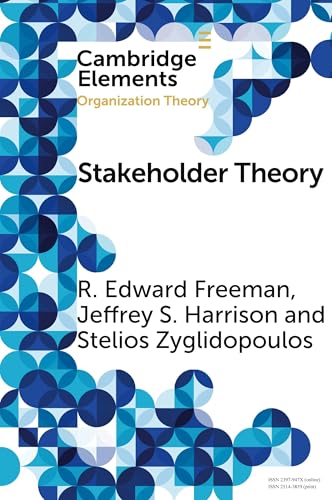Stakeholder Theory
Concepts and Strategies (Elements in Organization Theory)
R. Edward Freeman; Jeffrey S. Harrison; Stelios Zyglidopoulos
BOOK REVIEW

In today's world, where businesses and organizations are often seen as monolithic entities concerned solely with profit, the book Stakeholder Theory: Concepts and Strategies shatters that preconceived notion. Authored by the distinguished R. Edward Freeman, along with Jeffrey S. Harrison and Stelios Zyglidopoulos, this compact yet powerful work serves as both a clarion call and a guide through the complex, multifaceted web we call the stakeholder landscape.
At its core, stakeholder theory offers a radical perspective on how organizations should operate. It posits that companies do not exist in a vacuum, nor are they merely tasked with maximizing shareholder value. The authors invite you-yes, you-to rethink the structure of your own engagements, both personally and professionally. They urge every reader to understand that businesses must account for a variety of stakeholders: employees, customers, suppliers, communities, and even the environment itself. This brings us to the crux of their argument: every decision made-whether minor or monumental-ripples through this intricate web of relationships.
What elevates Stakeholder Theory beyond the mere academic is its actionable framework. Freeman and his co-authors outline practical strategies that organizations can implement to harmonize their objectives with stakeholder interests. By doing so, they equip leaders with the tools to forge stronger connections with those they serve, demonstrating the power of empathy in the business realm. This isn't just theory-it's a roadmap, a manifesto for tackling the ethical dilemmas that plague modern organizations.
Reflect on the insatiable appetite for profit that has characterized corporate culture over the decades. The financial crisis of 2008 served as a gut-wrenching wake-up call to many. Suddenly, the fragility of the traditional profit-maximization model was laid bare, revealing the urgent need for a shift in priorities. In this context, Stakeholder Theory isn't merely a book; it's a necessary guide through turbulent waters. It challenges you to question the status quo and, crucially, to champion a vision where business success aligns with societal well-being.
Readers have raved about the book's clarity and relevance; however, it hasn't been without its detractors. Some critics argue that the ideas, while noble, are overly idealistic and may lack practicality in high-stakes business environments where profit margins reign supreme. Yet, it's precisely this tension that makes the discourse around stakeholder theory so rich and vital. The book confronts these counterarguments head-on, inviting you to reconcile them with a new moral framework that could, in fact, enhance profitability when stakeholders thrive.
As you dive deeper into the discussions presented by Freeman and his colleagues, imagine the revolutionary potential this theory holds. Business leaders who embrace these concepts can redefine success-not just in terms of metrics and spreadsheets, but through building a legacy of trust and mutual benefit. This book prompts a consciousness that extends beyond traditional metrics and compels you to act with intention.
Ever wondered how companies like Ben & Jerry's or Patagonia built their trusted brands? They thrive on stakeholder engagement, and their success stories echo the principles laid out in this very book. Their dedication to social responsibility and environmental sustainability exemplifies the transformative power of viewing business through the lens of stakeholder theory.
Ultimately, Stakeholder Theory: Concepts and Strategies urges you to confront the formidable reality that the future of corporate governance may very well depend on our collective willingness to evolve. Your mind, your work, and your ethical foundation may very well be ignited by these principles-drawing you into a movement that seeks not only to inform but to adjust the moral compass of business.
Let this book light the spark of change within you. Organizations aren't just places to work or to invest; they are living entities intertwined with the fabric of society. By embracing stakeholder theory, you may just find that the key to a prosperous future lies in the very relationships you nurture today. Will you join the revolution? 🚀
📖 Stakeholder Theory: Concepts and Strategies (Elements in Organization Theory)
✍ by R. Edward Freeman; Jeffrey S. Harrison; Stelios Zyglidopoulos
🧾 75 pages
2018
#stakeholder #theory #concepts #strategies #elements #organization #theory #edward #freeman #REdwardFreeman #jeffrey #harrison #JeffreySHarrison #stelios #zyglidopoulos #SteliosZyglidopoulos